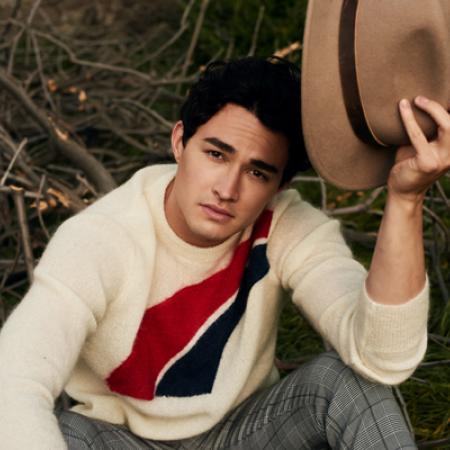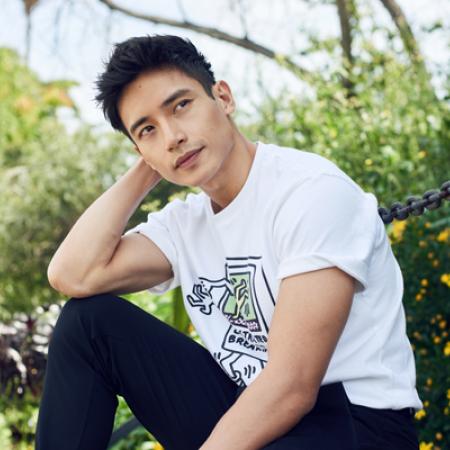Right now, Isabella Gomez is equal parts heartbroken yet proud of her breakout role in Netflix’s ‘One Day At A Time’ as Elena Alvarez. The show, which aired for three seasons, has yet to be renewed by Netflix for a fourth season, leaving its future hanging in the balance.
The series, which first started in 2017, was a re-imagining of the same idea from the late 70s sitcom, however is centred around a Hispanic family - and tackles such important issues as mental illness, sexism, homophobia, racism, and more. They’re issues which the cast are proud to be a part of, with Gomez telling me, “We get to talk about things we care about, and we get to show our community in a way that’s not stereotyped and shows us as actual humans.”
We hung out with Isabella Gomez in Los Angeles last month to talk about the show’s future, the importance of accurate representation on television, and her upcoming roles…
...to have these characters be so layered and so fully human makes it so that people relate to them aside from whatever culture they’re from or whatever group they feel like they identify in, and it humanises them, which in turn helps push forward all of the progress for all those other groups.
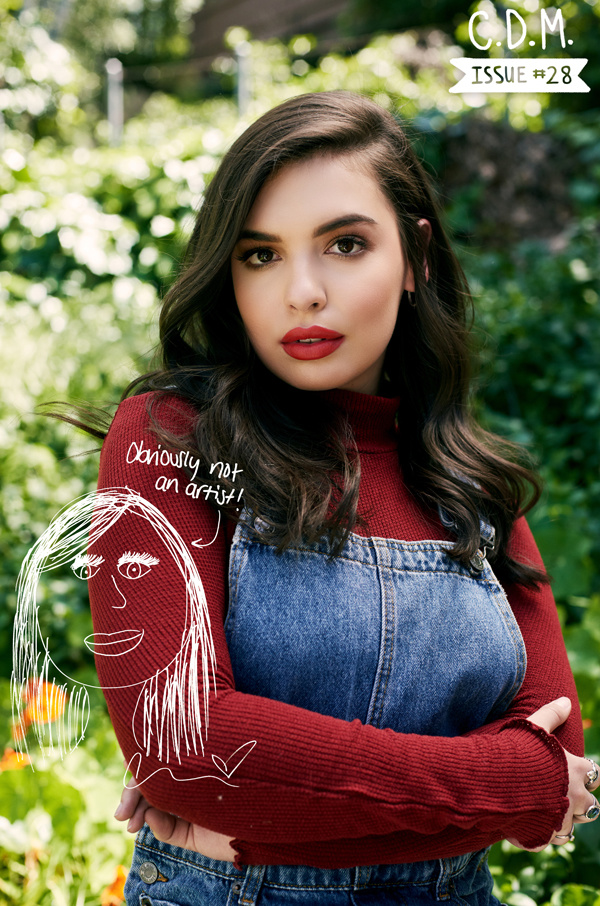
[Funnel Neck Top in Red Velvet, Denim Pinafore by Glassons.]
COUP DE MAIN: 'One Day At A Time' is in a bit of limbo at the moment, with Netflix not yet renewing the show for a fourth season - but it’s been receiving an outpouring of love online from people like Lin-Manuel Miranda. What’s it been like seeing that support from people who really, deeply care about the show?
ISABELLA GOMEZ: It’s everything! We were so heartbroken when we heard about the cancellation because this show means so much to us, not only for what it is and what it means to people, but this is the best work environment - it is such a dream come true! Not only with the environment, but also the writing is phenomenal, it is an actor's dream. You can do comedy! You can do drama! You can do it all within these twenty-five minutes that we’re shooting, and it’s just the best. We get to talk about things we care about, and we get to show our community in a way that’s not stereotyped and shows us as actual humans. So hearing about the cancellation was so heartbreaking, but what did make it better was seeing all the love, and seeing how much people are affected by this thing that we make every week, and how much it’s helped them in their own journeys, and knowing that whether we get to go on or not at least we got to make three seasons of the most incredible, touching show we could have ever hoped for. Just that is enough. But of course, it’s also a bummer.
CDM: If you could direct Elena in an episode of ‘One Day At A Time’, what would you want to happen?
ISABELLA: I’m interested to see her in college, like touring colleges - I feel like she’d be a little intense, I feel like she’d be asking a ton-and-a-half of questions, she’d just want to know everything about each college and so I feel like I’d love to see her doing that.
CDM: Having played her character for three seasons of TV, how close do you think Isabella and Elena are as people? Have the two kind of infused into each other at all?
ISABELLA: Elena is definitely influenced by Isabella because that’s all that I had to draw on obviously - but I feel like, I, Isabella, have changed so much because of her. I think I’m a much more receptive, open, informed person because of Elena, and I hope to become entirely her at some point. I just think if there were more people out there like her that are so young and so ready to take on the world and excited about change and wanting to make the world a better place and willing to do the work for it, I think we’d have ourselves in a really good situation.
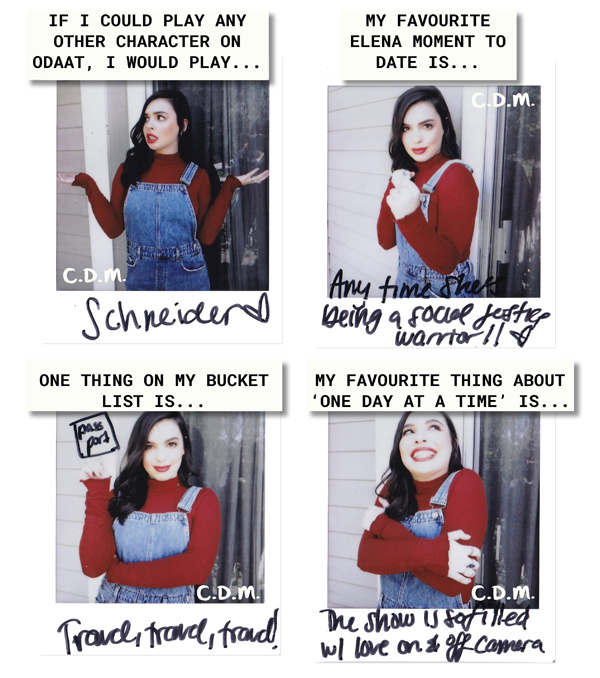
CDM: You’ve talked a lot about how Elena is a ‘layered’ character along with the other characters on the show. Why do you think layers to characters are so important?
ISABELLA: Because we as humans are layered! Nobody is one note or only one thing. We always have descriptive words like, “Oh, he’s boring, or he’s quiet,” or whatever, but if you look at a human they’re never just one thing. So what happens when you have one layered character is it becomes a stereotype, or it is the stereotype - the Latinx community is stereotyped as either very poor, very low socio-economic status, or gang-bangers, or drug addicts or stuff like that. So to have these characters be so layered and so fully human makes it so that people relate to them aside from whatever culture they’re from or whatever group they feel like they identify in, and it humanises them, which in turn helps push forward all of the progress for all those other groups. Because if we have just a girl whose whole description is that she’s a lesbian, then people who already think they don’t identify with LGBTQ+ people are not going to even try it. But if we have this girl, Elena, who's so smart and she’s cultured and she’s dorky, but she’s also very powerful and then she happens to be a lesbian, but it’s not her defining feature - because that’s the thing, it never defines us - then it also makes it so that that part of her is humanised, or whatever other part of her so that she becomes something that everybody can relate to. Then you’re not judging this person on one characteristic. But also because it’s so much more fun to see people who are layered and have things going on and have different thoughts about things.
CDM: It must have been so intense working on the episodes of Elena’s coming out so closely with Mike Royce [the show’s co-showrunner] - whose daughter those scenes are based on. Did you feel a sense of responsibility in showcasing a situation on-screen that so many people experience in their real life?
ISABELLA: Absolutely, but also, especially when we did the first season, I didn’t realise the lack of representation on TV for the LGBTQ community, so I just had the same responsibility I always have - to tell these stories accurately and being the best vessel that I can be for whatever character that I’m playing. Weirdly, it took some pressure off to know these people personally in the sense that I knew that I was doing it right because they would tell me if I wasn’t, and I had these people to talk to. I have had such lovely conversations through the three years about the LGBTQ experience and making sure that I was portraying this accurately. And then because Mike was so invested in this story, he made sure that from up top everything was perfect. So rarely did I have to come to them with anything, because the writing came from our queer writers and was also based on a true experience and was so taken care of and made with so much love, because it was kind of like a love letter to his daughter, that it made it so much easier for me.
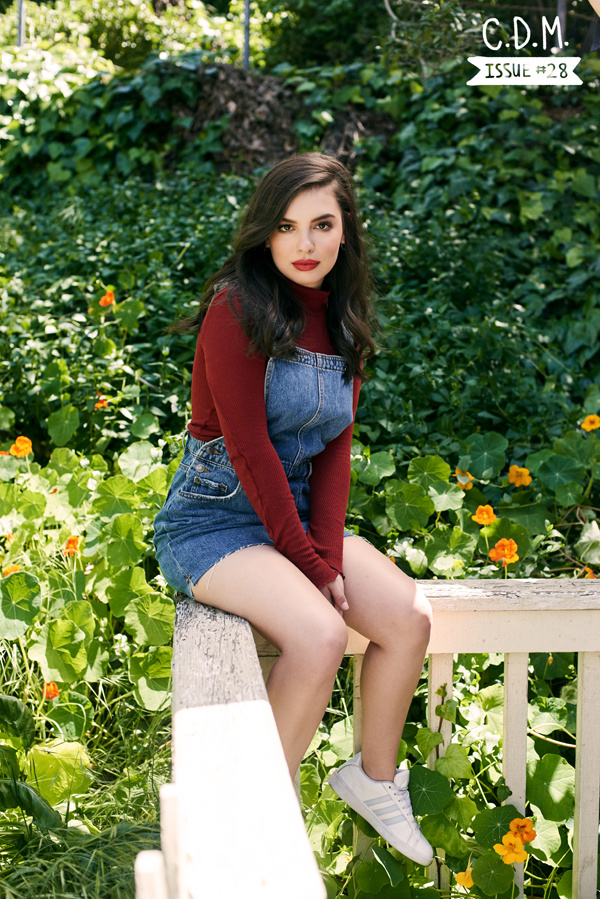
CDM: How do you feel about your relationship to the LGBTQ community now? So many people in the community feel that Elena is such an important depiction of love on-screen.
ISABELLA: I think this community has become my second family, and the way that they have embraced me and allowed me to grow is unlike anything I’ve ever experienced before. Which is so funny, because it’s a community that has received so much hate and so many awful things to them, so if there was anybody who was gonna be awful people they have the excuse! They are so filled with love and happiness, and they just want to accept everybody and make sure that everybody feels safe, and that’s how I feel within this community. I’ve learned so much. My favourite thing I’ve taken from the LGBTQ community is the concept of chosen family, I just think it’s such a beautiful notion and especially with artists that move around so much in this world - we’re always moving away from our cities for work or for whatever reason - the idea that you can still have a family, they taught me that, so I adore them.
CDM: It was also really cool to see Elena’s relationship with Syd develop throughout the season, and seeing the way that her family learned about non-binary and gender pronouns - and I think that’s one of the great things about the show, how it kind of educates people, but in a way that feels really natural. Do you think that through things like the show exploring these ideas, it helps to normalise them more in society?
ISABELLA: Absolutely! The reason why things aren’t normalised in our society is because we never see them - when was the last time you saw a non-binary character on TV? I don’t remember one besides Syd. We have both - with Elena we followed her journey and continue to do so, and that’s one way of normalising, showing this girl, somebody whom you loved before you knew anything about her sexuality, and then we move on and watch how everything affects her, but with Syd we wanted to do the opposite; they come in and nobody questions it, nobody treats them differently. We have questions just because we want to educate the older generations that totally don’t get it, but it was such a quick scene of like, ‘Here are what pronouns are, here are everybody’s pronouns, moving on,’ and after that it was such a thing. Especially with Schneider wanting to help them come up with an appropriate term, it was just the whole family wanting to integrate. This is how regular families have conversations, so it just makes it easier to have your own within your own family, but also normalises it because you’re seeing that nobody in this world that you love and these characters that you love cares, it doesn’t matter, and Syd fits right in. So it’s just a lovely way to normalise it.
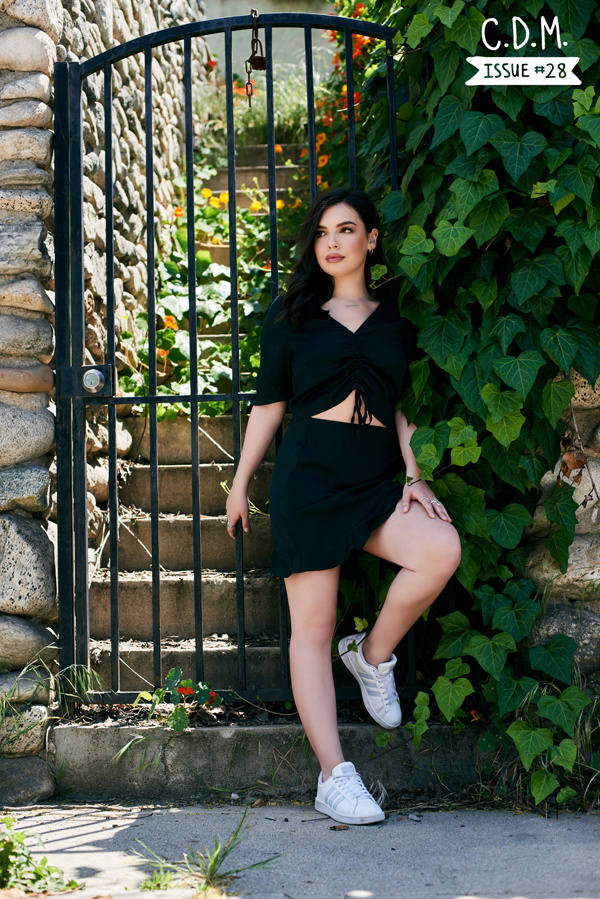
[Ruched Blouse and Mini Skirt in Eat Your Greens by Glassons.]
CDM: The other storyline I really enjoyed this season was Elena and Penelope having this kind of bonding experience about their mental health issues - and seeing people be so open about those kinds of things on TV was such a touching thing to see. What was that kind of experience like with you and your on-screen mum?
ISABELLA: Justina Machado is such a pro, and she’s the loveliest human, she’s such a mama bear! She protects me and will protect me to the end of the world, she’s the best. So working with her on that was lovely. I have a lot of protectiveness over anxiety and I was very scared to do it because I wanted to make sure I did it right and I was portraying the experience accurately, and it was through this that I learned that not everybody experiences anxiety the same way. I fought a lot with Gloria [Calderon Kellett, co-showrunner] that week about the way that Elena was experiencing anxiety because it’s not the same way that I do. I was like, “Well this isn’t it!” And I just didn’t want it to be presentational and I didn’t want it to be a joke, and so we had so many lovely conversations on-set - with Justina, with Gloria, with the writers, with everybody on how they experience anxiety and making sure that all of us that have experienced it felt that this was an accurate depiction and it was doing justice to it and not just making it a sitcom moment. Justina was such a big part of that - I took a lot of notes from how she had handled it in the past seasons and making sure that I kind of went behind her and then that it made sense that this would be two people experiencing this. Also just letting myself be taken care of, and I went a little method in that. <laughs> Justina was going to take care of me regardless, and that’s exactly what Penelope would do for Elena, so that was really lovely.
CDM: You started acting at age five - what’s been the biggest change you’ve found since you started in the entertainment business?
ISABELLA: Within the industry? Well, I started when I was five but I started in Columbia, so I wasn’t doing a lot.
CDM: How old were you when you moved to America?
ISABELLA: I was ten. I started taking classes and doing commercials here and there. The commercial industry is very much the business, but getting into character work - TV and film and all of that - I was fifteen. I’d been very lucky to be in this little bubble of privilege where I never noticed the racism or the sexism. I’m also white-passing so there’s that, and I was always very taken care of. My first show was ‘Matador’ and Gabriel Luna was the lead in that, and it was Robert Rodriguez’s show. I was the only underaged character and they took so much care of me. They made sure nothing ever happened to me, they made sure I was okay, they made sure that I felt comfortable with everything. I did a one-liner on ‘Modern Family’ which was also lovely, it was a bunch of different colours and different sizes and different sexualities. So that was that, and then I went on to ‘One Day At A Time’ basically - so funnily enough, it wasn’t until I came on to my show that I started noticing micro-aggressions in the world, and I started noticing what was happening within our industry. But that happened at the exact same time that the Me Too movement started happening. So it’s been a weird experience of me noticing all of the things happening but then also seeing them change, and seeing how now there’s the 50/50 by 2020 initiative, and making sure that we have diverse groups of people behind and in front of the cameras, and making sure that all of these things are happening. But I definitely see a little bit of a shaming thing in Hollywood, which I think is good in certain aspects of like if people don’t have POC, if people don’t have females, if people have just cis white men in a room, then we’re not into it anymore. People don’t want to work with that anymore.
CDM: It’s nice that people feel that they can be like, ‘But that’s not okay!’
ISABELLA: But that’s not okay! And that’s the thing! That’s what’s so lovely about our show. It initially was three white men - Norman Lear, Brent Miller and Mike Royce - making a show about a Cuban-American family with three female leads, and they said, “We can’t do this. We can’t make this because we don’t have the voice here that’s gonna make sure that this is authentic, so we need more people like that.” And that’s the thing, allies are so important - Norman Lear has been the biggest ally to every community for forever, so it’s not to say that white men don’t have anything important to say, not at all, they do, but we also need other voices. And I think that’s the biggest change in the industry right now, is people realising that - I don’t know how this wasn’t realised before - but then integrating it, and making sure that they’re integrating it, and there are so many programmes for young artists and all of this stuff that’s so incredible to watch happen. Especially from within.
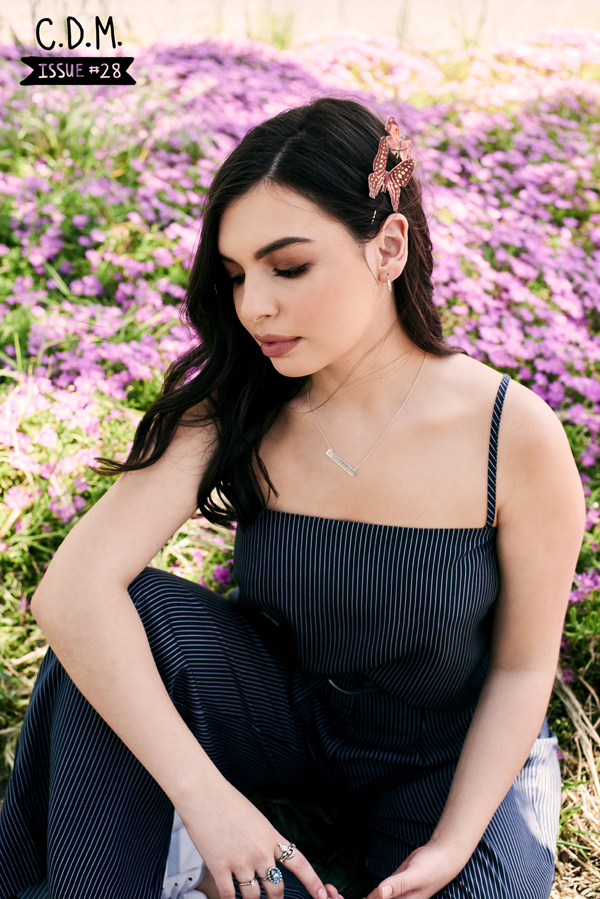
[Pinstripe Crop Cami and Belted Wide Leg Pants by Glassons.]
CDM: I saw you met Hayley Kiyoko at the GLAAD Awards! Are you a fan of her music/presence in the entertainment industry?
ISABELLA: I’m the worst ever with pop-culture and I don’t know anything - the only thing I watch is ‘Queer Eye’. I do know she’s super revolutionary and that she’s spoken a lot about women in her songs, and I know something happened where she had one song about women and her record label or somebody said that she couldn’t do any more and she was like, “What do you mean? That’s who I like!” And I think that’s incredible. She’s such an icon in the LGBTQ community, people love her so much and respect her so much and she’s done so much. So I love her for that. I’m not super familiar with her actual music which I should be - I really liked her in ‘Lemonade Mouth’! <laughs> That’s how far behind I am!
CDM: You can catch up! You’re busy with 'Queer Eye'.
ISABELLA: Yes.
CDM: I saw the 'Queer Eye' guys were also at the GLAAD Awards.
ISABELLA: I went to Jonathan Van Ness' birthday after and he was just the most incredible human.
CDM: He seems like a sweetheart.
ISABELLA: He is the biggest sweetheart. I was so confused as to why I was invited because I don’t know him, but when I was invited he was so lovely and he loves the show. Hayley was great and she was so nice, and I went up to her because Elena made a joke this season that she was the lesbian Jesus and people kinda threw a fit! They weren’t into it really, they were like, “That’s not you!”, so I had to! It’s like I have to talk to her and make sure she knows I’m not trying to take her name.
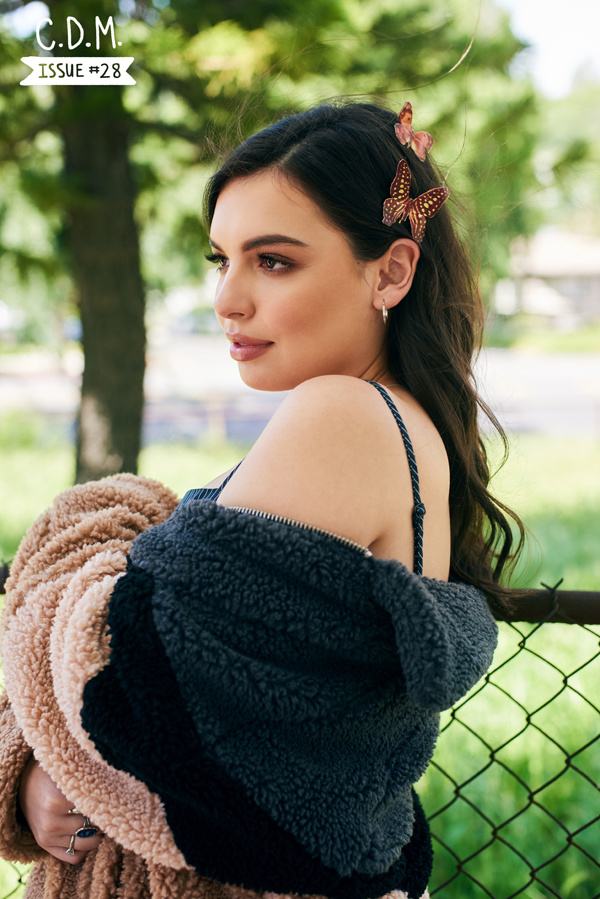
[Collared Borg Coat by Glassons. Reverie Bobby Pins by Heart Of Gold Designs.]
CDM: What can you tell me about 'A Cinderella Story: A Christmas Wish'?
ISABELLA: Oh my god, it was so fun, it was Laura Marano and Gregg Sulkin - Gregg who already I know because Ariela Barer who’s one of my best friends, and Rhenzy Feliz who’s my boyfriend, they all work on the same show, ‘Runaways’. So I already know him which was so fun, and Laura Marano is just the sweetest baby angel in the world, such a professional, so talented. It was my first movie ever, so it was so nice to get to work with them on that, and it was such a learning experience because I’ve been on a sitcom for three years, but it’s so fun. So basically the choreographer who choreographed the past four Cinderella Stories wrote and directed this one. Michelle [Johnston] - she’s the greatest, she’s so fun, she has such a collaborative energy, and it’s basically your typical Cinderella Story but during Christmas and more in this time. You could definitely see this happening in real life, it’s not so much like fairytale-y because they have really scaled down to real-life which is fun.
PHOTOGRAPHY BY KAREN ISHIGURO
HAIR BY BENJAMIN TERRY FOR THE ONLY.AGENCY USING SHU UEMURA AND T3
MAKE-UP BY ASHLEY DONOVAN FOR THE ONLY.AGENCY USING NARS COSMETICS
‘One Day At A Time’ Season 3 is airing now on Netflix - watch the trailer below…



